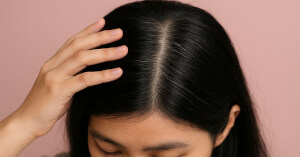
Supplements for Excessive Sweating (Hyperhidrosis): What Really Helps?

Excessive sweating, or hyperhidrosis, can be more than just uncomfortable. For many people, it impacts social life, work, and confidence. While medical treatments like prescription antiperspirants or Botox exist, many are curious about natural supplements that may help reduce sweating from the inside out.
In this guide, we’ll explore the most promising options, what science says, and how you can use them safely.
Understanding Hyperhidrosis
Hyperhidrosis is the medical term for sweating more than your body actually needs to cool itself. There are two main types:
Primary hyperhidrosis usually affects the hands, feet, underarms, or face and often starts in childhood or adolescence.
Secondary hyperhidrosis is linked to another condition, like thyroid problems, diabetes, or even certain medications. If your sweating comes on suddenly or happens mostly at night, it’s important to check with a doctor.
Can Supplements Really Help?
Supplements cannot "cure" hyperhidrosis, but they may support your body in ways that reduce sweat production or ease the triggers that make it worse. Some herbs act on sweat glands, others support your nervous system, and some nutrients help balance your stress response.
Let’s go through the ones most people turn to, and what research (and tradition) has to say about them.
Top Supplements for Excessive Sweating
Sage (Salvia officinalis)
Sage has been used for centuries as a natural remedy for hot flashes and excessive sweating. The secret lies in its essential oils and tannins, which seem to calm overactive sweat glands. Herbalists have long recommended sage tea, but standardized capsules are often easier and more effective for consistent results.
✔️ Typical Dosage Range: 300 to 600 mg of standardized sage extract daily, or 1–3 cups of sage tea.
Zinc
Zinc is an essential mineral that supports hormone balance, immune health, and skin function. Low zinc levels have been linked to overactive sweat glands in some people. While you can get zinc from foods like pumpkin seeds and beef, supplements can help if your diet falls short.
✔️ Typical Dosage Range: 15 to 30 mg of zinc gluconate or zinc picolinate daily, usually taken with food to avoid stomach upset.
Vitamin B Complex
B vitamins are crucial for nerve function and stress response. When your body is low in B vitamins, your nervous system can become overactive, which may trigger more sweating. Vitamin B5 in particular plays a role in balancing the sweat glands. Many people with stress-related sweating notice improvements when taking a daily B complex.
✔️ Typical Dosage Range: A standard B-complex supplement providing 50 to 100 mg of most B vitamins daily.
Magnesium
Magnesium is often called the "calming mineral." It helps regulate nerve and muscle activity and supports a healthy stress response. People who are deficient in magnesium sometimes report higher stress and more sweating. Adding it through supplements or food may help ease overactive sweat glands, especially if your sweating is triggered by anxiety.
✔️ Typical Dosage Range: 200 to 400 mg daily of magnesium citrate, glycinate, or malate, usually taken with meals.
Green Tea Extract
Green tea is rich in polyphenols that act as mild astringents and may reduce sweat gland activity. Some of these compounds also have weak anticholinergic effects, meaning they can slightly block the nerve signals that tell your body to sweat. While drinking green tea is great, standardized extracts can deliver higher concentrations.
✔️ Typical Dosage Range: 250 to 500 mg of green tea extract daily, ideally standardized to EGCG.
Witch Hazel (Hamamelis virginiana)
Witch hazel is best known as a topical remedy, but it’s also available in supplement form. Its natural tannins have an astringent effect, tightening the skin and reducing moisture. While oral use is less common, witch hazel capsules or teas may complement topical use for people struggling with excessive underarm or hand sweating.
✔️ Typical Dosage Range: 250 to 500 mg of witch hazel extract daily, or applied topically as needed.
Lifestyle and Dietary Tips
Supplements can help, but your daily habits make a big difference too. Here are a few tips worth trying:
- Stay well hydrated. Dehydration can make your body try harder to cool down, which increases sweating.
- Avoid common triggers like spicy foods, caffeine, and alcohol, which stimulate sweat glands.
- Eat zinc-rich foods such as pumpkin seeds, beef, and chickpeas, since zinc is linked to gland regulation.
- Practice stress-management techniques like deep breathing or meditation, since stress is one of the biggest sweat triggers.
When to See a Doctor
While supplements and lifestyle changes may improve mild sweating, they are not a replacement for medical care in severe cases.
If you sweat excessively at night, if your sweating started suddenly, or if it interferes significantly with daily activities, consult a healthcare professional. Conditions such as thyroid disease, low blood sugar, or certain infections can cause secondary hyperhidrosis that requires medical treatment.
Conclusion
Excessive sweating can be frustrating, but you are not alone. Natural options like sage, magnesium, B vitamins, green tea, and witch hazel may support your body and reduce the discomfort of hyperhidrosis.
Combine these with simple lifestyle tweaks, and you may notice a real difference. If sweating is still disrupting your life, a doctor can help you explore stronger treatments. Remember, supplements can be part of the solution, but they work best alongside a healthy lifestyle and medical guidance when needed.
Frequently Asked Questions
Can supplements cure hyperhidrosis?
No, supplements cannot cure hyperhidrosis. They may reduce symptoms by calming the nervous system or reducing sweat gland activity, but severe cases usually need medical treatment.
Is sage safe for long-term use?
Sage is generally safe when taken in moderate amounts. However, high doses for long periods can affect the liver due to thujone, a compound found in sage oil. Stick to recommended doses and take breaks if using it for months at a time.
Which vitamins are linked to sweating less?
B vitamins, especially B5, support nerve balance and may help reduce stress-related sweating. Magnesium also works as a calming mineral that can ease overactive sweat responses.
Should I combine supplements with prescription treatments?
Yes, many people safely combine supplements with medical treatments like prescription antiperspirants or Botox. Always check with your doctor to avoid interactions and to make sure supplements are safe with your current health condition.
Can diet really reduce excessive sweating?
Yes, diet plays a role. Avoiding spicy foods, alcohol, and caffeine can reduce sweating, while staying hydrated and eating zinc-rich foods can help regulate sweat glands.
This article was originally published on Stackbb, your trusted source for science-based supplement guides.







